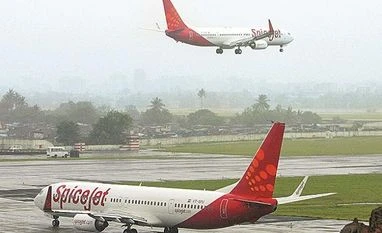There’s a thin line between bravery and bravado, aggressive and rash. It is this line that many in the aviation sector argue low-fare airline SpiceJet and its co-founder Ajay Singh appear to be treading during the pandemic. There are some who admire the way Singh has reacted when his back has been against the wall but with the airline announcing its plans last week to start direct flights to London in the winter of 2020, the list of naysayers is growing.
After the lockdown crippled the aviation sector and brought passenger traffic to a halt, airlines globally stared at a bleak future. As the weeks rolled on, the usual revenue streams for the carriers dried up as expenses continued to impinge on existing finances. All airlines were stuck with salaries, aircraft that needed maintenance, and the bills began to pile up. Even if the aircraft were not flying, staying afloat required funds.
Very soon after the shock, the industry — led by SpiceJet — honed in on cargo as a revenue stream, a step followed quickly by market leader IndiGo. This was true not just for Indian carriers; many foreign airlines filled aircraft with goods instead of passengers. Almost all the Indian airlines started flying Vande Bharat routes, which the government had started to ferry passenger stranded overseas owing to the suspension of international flights, and charter flights that helped bring in much-needed cash. In addition to this, in March, the airlines had some cash collected from passengers for flights that were to be taken in the weeks to follow but were in fact cancelled.
For the cargo flights, many airlines used their existing fleet but SpiceJet decided to wet-lease two aircraft and is now operating a fleet of 13 cargo aircraft (two wide-bodies on wet-lease) and is planning to add three more soon, a gambit that many felt was quite rash, since wet leasing is expensive — it includes the cost of hiring crew and maintenance staff — and is usually not considered an optimum option. The airline, however, said the cargo push has really paid off with revenues from cargo up 144 per cent in the first quarter of this year over the same period last year. SpiceXpress — its cargo wing — has been in operation since September 2018.
Last week, however, the airline went a step further and announced direct flights three times a week to London starting this winter — again with aircraft taken on wet-lease. Although Vistara, too, has started flights to London recently, market leader IndiGo — which is in the strongest position to go international — has not taken the plunge, opting for caution in the present environment.
SpiceJet’s decision raised many eyebrows; industry experts felt it was both “rash”, “unplanned”, “at the wrong juncture”. Said industry veteran Shakti Lumba: “Timing-wise this seems nothing short of suicidal. Instead of stabilising the airline during the crisis, he seems to be hurtling it headlong into more trouble.”
Lumba argued that there will be “no first-mover advantage”, hardly any load (Vistara’s London flights have seen indifferent loads) as a result of the pandemic and that wet-lease is an expensive option in any situation.
Many others agreed with Lumba, saying it almost appeared as though the airline had stopped keeping accounts. “It’s almost as if SpiceJet has lost touch with reality,” said a former SpiceJet staffer, who has been closely associated with the airline.
The airline, however, contended that the move was neither rushed nor unplanned. In response to an email, the airline said it had been mulling the move to get into long haul for over two years and a dedicated team had been working on it.
The airline had applied for Heathrow slots in the past too as well as for designated carrier status “well before the lockdown”. “London is a heavily competitive sector and Heathrow is a constrained airport so chances need to be taken as and when they present themselves,” an airline insider said.
The airline added that wet-leasing costs are very low currently and the travel bubble meant competition was less and December was peak season.
Nevertheless, industry experts questioned Singh’s solo approach of running the carrier, a charge made many times against the way he functions although the airline has always maintained that Singh has an efficient team backing him up. Recently, the airline’s CFO Kiran Koteshwar put in his papers, though a replacement is expected soon, according to sources.
A former aviation secretary argued that instead of trying to recapitalise the airline, Singh seemed determined to burn more cash. Pointing towards a recent Centre for Asia Pacific Aviation estimate that put the fund requirements for the airline to stay afloat at nearly $300 million, he argued that introducing a new international sector at this juncture, even if not daily, was unlikely to help matters. “Keeping up with the Joneses will prove costly,” he added, arguing that London was some kind of “psychological victory” for Indian airline owners. But he was of the view that no matter which long-haul route an airline introduces, it takes a few months for it to stabilise. Whether he proves right or Singh proves his critics wrong will be keenly watched in the next few months.
Unlock 30+ premium stories daily hand-picked by our editors, across devices on browser and app.
Pick your 5 favourite companies, get a daily email with all news updates on them.
Full access to our intuitive epaper - clip, save, share articles from any device; newspaper archives from 2006.
Preferential invites to Business Standard events.
Curated newsletters on markets, personal finance, policy & politics, start-ups, technology, and more.
)